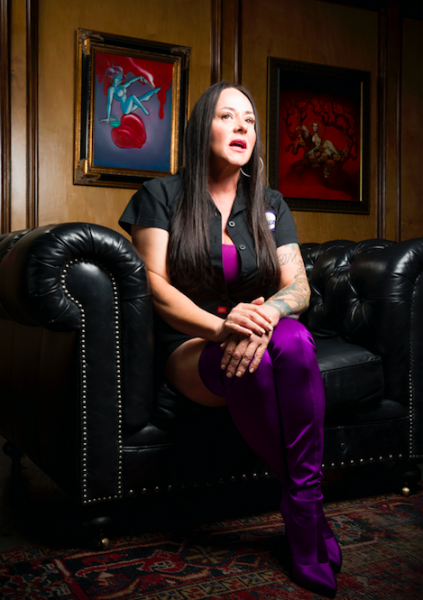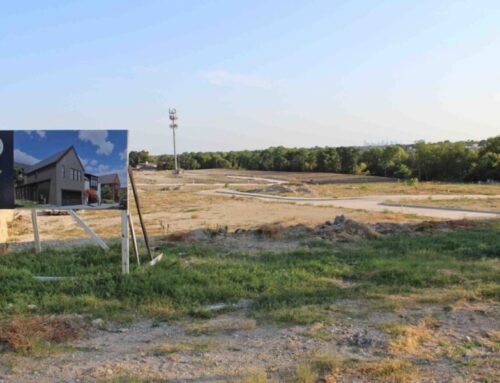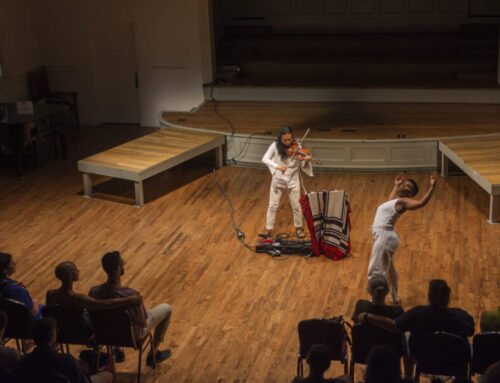
Sharon Flatte is a role-model for women determined to work in a male-dominated industry. (Photo by Danny Fulgencio)
Women are running Deep Ellum. That’s straight from the mouth of the district’s unofficial mayor, male artist and gallery owner Frank Campagna.
Sharon, a young, eager artist, walked into Tigger’s, Dallas’ first tattoo parlor. Accompanied by an inked-up man, Sharon’s human portfolio if you will, she asked Mark “Tigger” Liddell for a job.
“I don’t hire girls,” the shop owner told her. Then, she says, he said something lewd. (We kept it off the record; he’s not around to defend himself.)
Having grown up in Amarillo with five brothers and few resources, the “girl” had a thick skin.
She turned on a high heel, chin up, and marched out of the store.
Her resolve to thrive in the industry intensified that mid-1990s day.
Even she didn’t know she would own Tigger’s in a couple of years.
She’d dealt with this sort of thing since high school. She barely graduated. Her counselor figured administrative work was the pretty students’ lot and filled Sharon’s schedule with secretarial classes. The savvy senior found shorthand and typing classes offensive and boring and (like insolent commentary related to her femininity) galvanizing.
With Tigger’s temporarily in her dust, she found Alice’s Asylum, an underground, bare-bones operation.
“It was freestyle, guys tattooing with their shirts off, there was no air conditioning, and they were really serious,” she recalls. This place was raw, and they didn’t care that she was a woman, as long as she did good work.
Building a business after losing the love of her life
That’s where she met her husband and business partner, Jimmy Flatte. She and Jimmy’s aspirations aligned. In 1994 they opened Taboo Tattoo, a few doors down from Tigger’s.
They bought Tigger’s a year later.

Tigger’s today (Photo by Danny Fulgencio)
“[Liddell] had been living over the shop, and the first thing I did was rent a dumpster and start gutting the place,” Flatte says. She’s since transformed the upstairs into sterile-meets-hip workspaces for her artists. Downstairs imitates an art gallery, one specializing in voluptuous, sword-wielding nudes. (“I want it to be welcoming, comfortable … not arrogant or crude. I don’t want a list of “No”s on the front door,” she says.)
Over the next few years they acquired shops in Dallas, New Orleans, Oklahoma. Sharon soaked up business acumen from Jimmy and others she admired. But when Jimmy died, everything changed.
“Cancer,” she says, “12 years ago.”
A dark time ensued.
“We had built everything together,” she says.
Deep Ellum, the effervescent area she so adored, was dying too. Throughout the once vibrant, visceral district, businesses shuttered until almost nothing remained. Sharon’s son Cody Biggs—a celebrated artist in his own right, who had been running one of her shops in Oak Cliff—suffered a serious motorcycle accident and couldn’t work.
An acquaintance from Los Angeles—“a big huge name in the business”— offered to help, came to Texas and told Sharon he’d take care of things while she “recovered.” She says it was “clear from the get-go he just wanted me out of the picture.” “His old-school way was not my way, so I fired him.”
He did not take it well. Things heated up until Flatte, donning her favorite thigh-high platforms (a style that still suits this grandmother to a 10-year-old), “kicked him in the ass so hard,” she recalls, “he slid across the floor.”
It was all too much. Ever pragmatic, she made the strategic decision to streamline, selling every studio except Taboo and Tigger’s.
Flatte embodies a trend in Deep Ellum today.

Frank Campagna at the Kettle Art Gallery. He may look like a mob guy, but he’s a talented teddy bear. (Photo by Danny Fulgencio)
As artist and local legend Frank Campagna puts it: “Women are running Deep Ellum right now.”
The charismatic owner of Kettle Gallery (alongside Tigger’s) rattles off names: “Consider Rebecca [Bogart] at La Reunion, Lauren [Levin] at Urban Paws, Kathleen [Evett] Upper Paw, Giselle [Ruggeberg] at Jade & Clover, Paula Lambert at Mozzarella Cheese Company, Susan Reese of Madison Partners … In other words,” he continues, “There are an awful lot of independent ladies who run their own show.”
Campagna, an East Dallas resident who spearheaded much of the revitalization of Deep Ellum, introduced Paula Harris, a Richardson dweller (who later would become his live-in girlfriend), to his stomping grounds, and she was smitten.
She learned everything possible about Deep Ellum and its players.
“Frank knows it all, especially the history,” she says.
He’s been around there much longer.
Flatte, especially, was an inspiration, Harris says.
“Sharon was a trailblazer when they wouldn’t let the girls play.”
With Kettle as her home base, Harris founded Discover Deep Ellum and Wine Walks, where tourists buy a local-art enameled wine glass (“Cody, Sharon’s son, did one that was exquisite,” she says) before visiting various venues.
“Jade & Clover took the neighborhood by storm,” Harris says. “People come in the gallery just looking for Giselle’s store.” Harris is dropping names where Frank left off: There’s Catherine Jacobus at Stonedeck and, of course, Lake Highlands local Whitney Barlow, who, with husband Clint, re-opened Deep Ellum’s most fabled concert venue, Trees, and later The Bomb Factory and Canton Hall. It was Clint’s idea to retain the name Trees, Whitney has said. It’s Trees. Where Kurt Cobain once punched a security guard, arguably in self-defense. Trees, from whose stage Thom Yorke’s voice once wafted into the bustling streets, captivating passersby. No other name would do. “But Whitney,” Clint told us a few years ago, “she’s the one you need to talk to.” She does so much of the work.

Whitney in the forefront and Clint Barlow re-opened Trees, Bomb Factory and Canton Hall, preserving the ambiance while subtly modernizing amenities. (Photo by Benjamin Hager)
Of her first look at Trees Whitney recalls, “It was a disaster. Five years worth of water damage. You could see sky through the ceiling. There were roaches on the floor. I said, ‘This is awesome’. I think Clint thought I would say, ‘No way,’ but there was just a great vibe.”
The re-opening of Trees in 2011 kicked off a renaissance of Deep Ellum, according to the late Barry Annino, former Deep Ellum Association president. “Once they opened, people got excited and wanted to be around them. They are pioneering the comeback of Deep Ellum.”
Whitney doesn’t see it that way, because so many are working to nurture the venue and the neighborhood. “We couldn’t be successful if we acted like we knew it all, like we could do it all ourselves,” she says. “We need people around us and are not afraid to ask for help.” The Bomb Factory re-opening was even bigger, literally. The 50,000 square feet of space accommodates more than 4,000.
Like Tigger’s, the Barlows’ concert halls have preserved the ambiance of the past, but all have matured, like a starlet with a top-notch plastic surgeon.

Amanda Austin owns The Comedy House.
Amanda Austin, who, against the odds, made a ginormous success of the Comedy House on Main, fought off developers (by battle’s end, backed by an army of advocates) to keep her space from becoming a barbecue joint.
[Check out how far Austin has come since this 2009 interview]
When discussing the economic revival of Deep Ellum, it would be remiss to omit the contributions of real estate developer Scott Rohrman, who bought up most of the neighborhood when it was near empty. He left it that way as he searched for the right balance of tenants.
“I didn’t like him at first,” Sharon Flatte says. But in the end, he became another business mentor to me. One thing he wanted was to take down all the neighborhood’s neon signage, but he finally relented on the Tigger’s sign. It’s been synonymous with Deep Ellum since the 80s.
It was one thing on which the thigh-high-booted artist/entrepreneur wouldn’t budge.







Leave A Comment